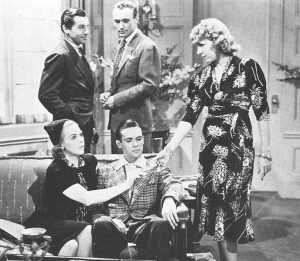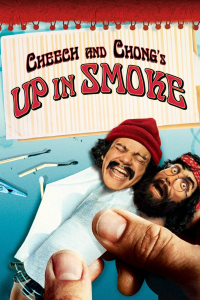The Stoner: Evil Afoot

In 1936, a church group financed Reefer Madness with the sole intent of exposing what they believed to be the insidious evils and horrendous consequences of smoking marijuana. The young protagonists of this paranoid cinematic perspective live up to the objective of the producers, as they descend into a nightmarish quagmire filled with flights of hallucinatory madness, sexual assault, manslaughter, betrayal, and ultimately murder and incarceration.
Five decades later, Reefer Madness, owing to its hyperbolic and melodramatic tone, became a cult classic among marijuana smokers, as young people got high, watched it, and roared with laughter. As author and commentator Robert Lane accurately captures: “Meant to be an important and affecting cautionary tale, this dated black-and-white film’s true value is in its many entertaining moments of unintended hilarity.”
The Stoner: Cheech and Chong Style
This comedic overtone eventually became a theme for how marijuana movies depicted tokers. Starting in the late 1970s and continuing for more than three decades, Cheech & Chong, a comedy duo consisting of actors Cheech Marin and Tommy Chong, capitalized on this humorous depiction of the consumers of the devil’s weed, spawning more than 15 films centered around madcap, farcical episodes consisting of toking, smoking, joking, and provoking.
And although Cheech and Chong’s self-authored depictions were of harmless and somewhat endearing and lovable pot pranksters, they were nonetheless aggrandized stereotypes: the continually stoned smoker, living in a haze of semi-delusional dopedome, his entire universe consisting of locating, buying, and inhaling cannabis in an all consuming quest to achieve the ultimate high, barely aware of his surroundings or the consequences of his behaviors. This sentiment of the stoner-jester archetype was captured perfectly in the following exchange between Marin and Chong in the Cheech and Chong’s Next Movie (1980), the sequel to Up In Smoke (1978), the flick that ushered in the Cheech and Chong brand:
[After gasoline that has spilt on their clothes, Chong tries to light a joint.]

Chong : You got a light, man?
Cheech : Huh, oh yeah, here. [hands him a lighter] Hey I don’t think you better light it in here, man.
Chong: Why?
Cheech : Ah, these gas fumes, man.
Chong: Oh man. [flicks the lighter]
Cheech: I don’t know. [the inside of the car explodes] Hey, what are you trying to do, kill us, man?
Chong: What a flash, huh?
All of this stereotyping by the comic duo is a bit ironic, given that they are serious activists for the full legalization and de-stigmatization of marijuana. Still, the stoner-jester archetype persisted. As the authors of How the “Stoner” Lifestyle Has Changed Over Time from the publication The Way of Leaf remark, “. . . stoners were said to be high all the time, and incapable of performing tasks to a high level. Instead, they were perceived as ‘lazy’ individuals with no goals or dreams.”
Stoner Evolution?
The litany of stoner movies released from the 1990s onward served mostly to reinforce this jokester image of the hapless, directionless stoner. Whether it’s the urban antics of the Friday franchise, the crazy schemes of Half -Baked, the juvenile power-of-weed tropes of How High, or the facetious, Odysseus-like quest of Harold and Kumar Go to White Castle, “the song remains the same.”
Stoner Revamp
However, there is always a voice crying out in the wilderness for a change in the perception and usage of cannabis. Joe Rogan, the former UFC commentator, comedian, and marijuana activist, is probably the best example of that voice. In an interview with Ted Nugent, who contends that marijuana makes people undisciplined, Rogan pushed back:
“What I’m saying is I know a lot of people who use—whether it’s psychedelics or marijuana—and they use it to enhance their perspective. It doesn’t become the primary focus of their life. It doesn’t consume their life. They don’t allow it to consume their life. There’s a whole other world of disciplined marijuana enthusiasts.”

But perhaps what Rogan is best known for is his interview with Elon Musk, in which the eccentric, beloved self-made billionaire, founder of Tesla, and creator of SpaceX famously puffed a doobie with Rogan on his podcast, causing a media firestorm. Although it would be a fantastic stretch to say Musk is a symbol of the marijuana liberation front, nonetheless, that moment was crucial, as it belied the notion that pot smokers are foolish sops incapable of serious thought or focused action.
Stoners and Television
Of course, there are television shows that counteract the stoner-jester cliché. As the writers of Cannabis Now state in the article Casual Cannabis Use on TV Is Becoming Common, “Shows such as BoJack Horseman (2014), Broad City (2015), Love (2016) and Santa Clarita Diet (2017) are just a few modern programs that have taken this approach. Though none of the aforementioned shows are about weed, all portray characters who casually consume cannabis. This normalization goes a long way; it’s relatable, realistic and believable.”
There are also several cannabis-centric shows that take a stab at creating a richer, more nuanced version of marijuana smokers. The show Grace and Frankie has made inroads at normalizing and humanizing ganja use. Yet, even Grace and Frankie have moments of stereotyping. Frankie, while superficially charming and ultimately a morally grounded person, often lapses into a 60s-theme caricature of the quasi-clueless idealized stoner who has a quixotic if not tenuous grasp of current reality, and this aura is implicitly but obviously connected to her current or former use of marijuana. In one episode, Frankie quipped, “No, no, that wasn’t a stroke. They hadn’t perfected edibles back then.” Funny? Yes. But still a bit of a stereotype.
And though it only ran for two seasons, the show Disjointed attempted to give a more well-rounded depiction of cannabis consumers. Set in a marijuana dispensary, the cast of Disjointed is a collection of likeable, offbeat characters who, like everyone else in life, are just trying to figure it all out. Nonetheless, if the aim was to elevate marijuana usage to a higher plane (okay, I couldn’t resist), the writers of Disjointed fall remarkably short. In the Mashable article, Marijuana representation on screen: There’s still a long way to go, the author Chris Taylor, contends that the characters, Dank and Dabby are ultimately portrayed as “two most clownish, over-indulging stoner characters.”
Need evidence? When Dank and Dabby get stuck on the roof of the dispensary, they lack a means of combustion, thus depriving them from the sweet bliss of bud. As they try desperately and unsuccessfully to light a joint, they wax intellectual (even their vocabulary is noticeably upgraded) about the lack of direction and structure in their lives, ultimately promising themselves to create a 10-year plan for their shared futures. Predictably, they find matches, and succumb to lighting up, (the plan goes down the proverbial doob tube) thereby confirming what we all know about stoners: they are going nowhere, slowly, but inevitably.
At the end of the day, what is called for is a more realistic portrait of marijuana users, one that shines a light on the spiritual and cerebral aspects of weed, juxtaposed with the silly, sometimes-comic social characteristics of getting high. In this world, a marijuana smoker is at once intelligent, reasoned, and insightful, discerning patterns of dysfunctionality and discovering untapped potentials while simultaneously spacing out and forgetting where they placed their keys and wallet.

I’ll end with the sentiments of a true intellect and humanitarian, the astrophysicist and cosmologist, Carl Sagan:
“The illegality of cannabis is outrageous, an impediment to full utilization of a drug which helps to produce serenity and insight, sensitivity and fellowship so desperately needed in this increasingly mad and dangerous world.”
Your opinion matters. Please share your thoughts in our survey so that Newsweed can better serve you.
Are you a budding poet? Enter our poetry contest for bragging rights and an opportunity to win some cash!






